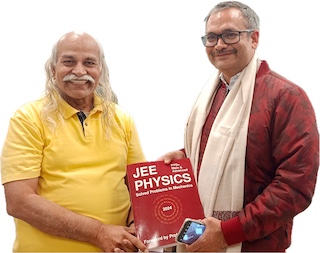A non-trivial problem related to surface area and volume of
Find the breadth and the height of a cuboid with square base, being given the volume 63 $\mathrm{in}^3$ and surface area 102 $\mathrm{in}^2$.
Discussion:This problem is from the book "How to Solve It" by George Polya. Let us reproduce Polya's words.
What are the unknowns? The side of the base, say $x$, and the height of the cuboid, say $y$.
What are the data? The volume, 63, and the area, 102.
What is the condition? The cuboid whose base is a square with side $x$ and whose height is $y$ must have the volume 63 and the area 102.
Separate the various parts of the condition. There are two parts, one concerned with the volume, the other with the area.
We can scarcely hesitate in dividing the whole condition just in these two parts; but we cannot write down these parts "immediately". We must know how to calculate the volume and the various parts of the area. Yet, if we know that much geometry, we can easily restate both parts of the condition so that the translation into equations is feasible. We write on the left hand side an essentially rearranged and expanded statement of the problem, ready for translation into algebraic language.
| Of a cuboid with square base | |
| find the side of the base | $x$ |
| and the height | $y$ |
| First. The volume is given. | 63 |
| The area of the base which is square with side $x$ | $x^2$ |
| and the height | $y$ |
| determine the volume which is their product. | $x^2y=63$ |
| Second. The area of the surface area is given. | 102 |
| The surface consists of two squares with side $x$ | $2x^2$ |
| and of four rectangles, each with base $x$ and height $y$, | $6xy$ |
| whose sum is the area. | $2x^2+4xy=102$ | .
Translation to the algebraic expression set up following equations
\begin{align} x^2y=63 \\ 2x^2+4xy=102. \end{align}The first equation gives $y=63/x^2$. Substitute this into the second equation to get,
\begin{align} x^3-51x+126=0. \end{align}This is a cubic equation. One factor of $x^3-51x+126$ is $(x-3)$ and the other is $(x^2+3x-42)$. Thus, one solution is $x=3$. Substitute $x=3$ in $y=63/x^2$ to get $y=7$. We encourage you to solve $x^2+3x-42=0$ to get the other solution(s).
ALSO SEE
See Our Books
